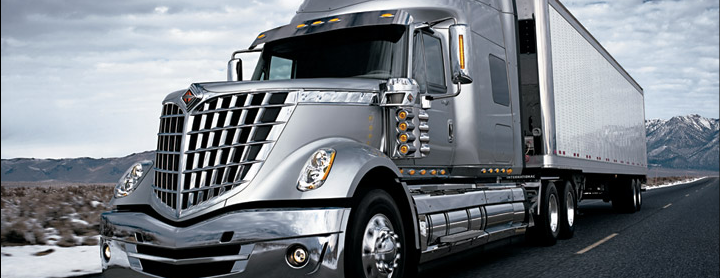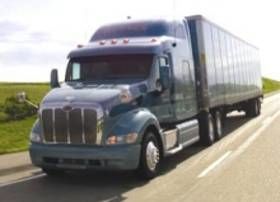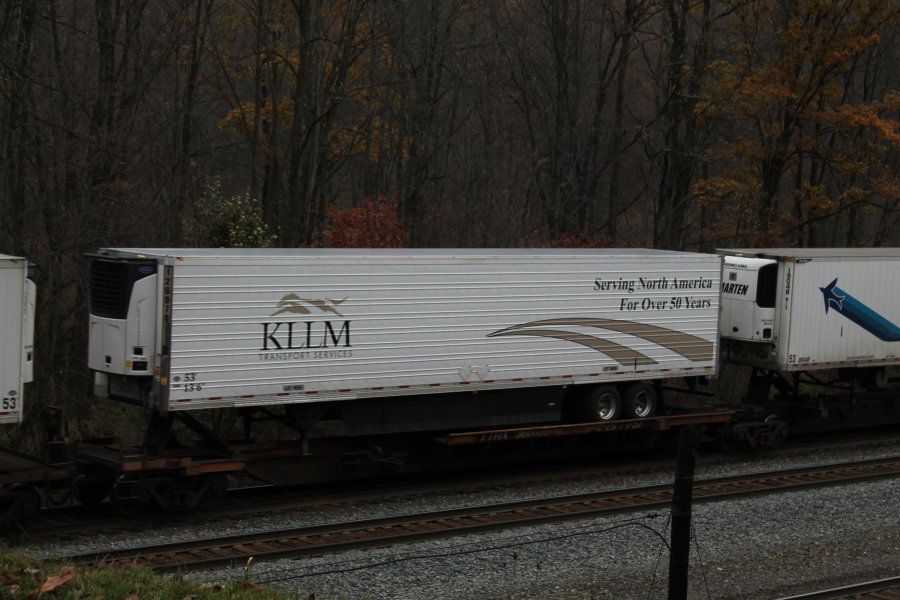Would There Be Any Hard Feelings?
Topic 17092 | Page 3
Renegade, I think you'd be going to too much trouble for little advantage. Maybe KLLM had the latest equipment, no waiting for simulator or drive time, with one on one instructors - whatever.
Your goal should be simply to get a CDL. There's another current topic that discusses just how much you learn at each stage of training (barely enough to pass). Being successful at backing is not done on the backing range, it's done in your head. Yes you need to memorize 104 or so pre-trip items. You can start that now (we have that here, too).
Your real training - the part that starts you toward being a million miler - is when you are on the road, on your own.
Why go to a reefer school if you're not going to use the reefer knowledge?
Here's (yet) another thing to consider.
Most trucking companies charge A LOT OF MONEY for their training. Usually, even more than most PRIVATE SCHOOLS. This is an INDUCEMENT to stay on and re-pay your training (make it FREE) by driving for them the contractually obligated amount of time.
While KLLM might be flattered that you just want to pay them for school - rest assured there are a number of the better private schools, that would be just as "advanced" and have a great reputation. If Averitt is your goal - why not call them and see which schools are APPROVED BY THEM (click on the link towards the bottom to get the list of schools). I didn't see KLLM on the list of approved schools - so if you were planning on going there for "school" and then bailing to Averitt - they may not even ACCEPT KLLM as schooling - and default back to the minimum number of months/years to come onboard as an "experienced driver".
I think you're taking the LONG WAY AROUND this - especially, if you are willing to pony up the $$ and pay for your own training.
Keep in mind that Averitt - while a very well reviewed company, is not the ONLY GAME IN TOWN. While they may be at THE TOP of "your list" - are there any others?
Rick
CDL:
Commercial Driver's License (CDL)
A CDL is required to drive any of the following vehicles:
- Any combination of vehicles with a gross combined weight rating (GCWR) of 26,001 or more pounds, providing the gross vehicle weight rating (GVWR) of the vehicle being towed is in excess of 10,000 pounds.
- Any single vehicle with a GVWR of 26,001 or more pounds, or any such vehicle towing another not in excess of 10,000 pounds.
- Any vehicle, regardless of size, designed to transport 16 or more persons, including the driver.
- Any vehicle required by federal regulations to be placarded while transporting hazardous materials.
Reefer:
A refrigerated trailer.
EPU:
Electric Auxiliary Power Units
Electric APUs have started gaining acceptance. These electric APUs use battery packs instead of the diesel engine on traditional APUs as a source of power. The APU's battery pack is charged when the truck is in motion. When the truck is idle, the stored energy in the battery pack is then used to power an air conditioner, heater, and other devices
In his original post he said he paid for it in full....... So if that is the case its like he paid for private school... Then he can go to which ever company he wants? I have heard guys say they don't want to do reefer other than the noise from the unit and checking on it whats the deal?
Reefers - aside from the noise, and the hassles of keeping it fueled, making sure the temp stays where the customer wants it (so the load isn't refused) are typically more time consuming - because they are more live loads than drop/hooks - so they burn up more of your clock than some other types of freight.
Rick
Reefer:
A refrigerated trailer.

Reefers - aside from the noise, and the hassles of keeping it fueled, making sure the temp stays where the customer wants it (so the load isn't refused) are typically more time consuming - because they are more live loads than drop/hooks - so they burn up more of your clock than some other types of freight.
Rick
gotcha Thanks
Reefer:
A refrigerated trailer.
The long wait at food distribution places. I go to these places a lot to deliver Napkins, TP, paper towels, dispensers, etc.. They tend to give mass appointment times. So you and about 5-20 other trucks all have the same appointment time. You shuffle in, in order and are given doors on a first come, first serve. So if you pull up to a RCVR let's say at 10pm with a 4am appt time. Yes, you will be unloading during your 10 hr. There are 8 trucks ahead of you parked in the "driveway". You have the potential to be the 9th truck in a door. Most of these places are nice and will send someone out to pound on doors to wake the truckers up. Trust me there is no rhyme or reason to when they come out. It is when they are ready. So with the above example, let's say they decide they are ready at 3:15am. You will get a knock on your door then. You best be ready to move when that knock comes. If you are not moving with the rest of the line, someone WILL pass you. By passing you, they could of just saved themselves an hour or two.
Drive Safe and God Speed.

Thanks to everybody that took time to provide me with the best feedback possible on this type of scenario. There's some really good advice here on this topic and I'm taking it all to heart. There's one thing I failed to consider and that's the fact that KLLM has an intermodal division as well and that was something I was really interested in before I started narrowing it down to flatbed or dry van. I don't want anybody to think that I am just anti-reefer, it's just that I don't think it best suits me or my interests when it comes to the type of trucking job I want to pursue. Once again, whatever school I choose to attend, I will be paying for it in full UP FRONT.
Intermodal:
Transporting freight using two or more transportation modes. An example would be freight that is moved by truck from the shipper's dock to the rail yard, then placed on a train to the next rail yard, and finally returned to a truck for delivery to the receiving customer.
In trucking when you hear someone refer to an intermodal job they're normally talking about hauling shipping containers to and from the shipyards and railyards.
Dry Van:
A trailer or truck that that requires no special attention, such as refrigeration, that hauls regular palletted, boxed, or floor-loaded freight. The most common type of trailer in trucking.Reefer:
A refrigerated trailer.
OWI:
Operating While Intoxicated
OOS:
When a violation by either a driver or company is confirmed, an out-of-service order removes either the driver or the vehicle from the roadway until the violation is corrected.

Renegade considering your point about intermodal , true KLLM does move a large number of their perishable loads TOFC, including non-perishable backhauls. However a driver might still need to endure prolonged loading and unloading times at the KLLM customer. It all depends on how they are organized and the types of customers they service. Also many times it's the local drivers or contractors handling the dray move to and from the rail yards. Good luck!
 reefer
reefer
Intermodal:
Transporting freight using two or more transportation modes. An example would be freight that is moved by truck from the shipper's dock to the rail yard, then placed on a train to the next rail yard, and finally returned to a truck for delivery to the receiving customer.
In trucking when you hear someone refer to an intermodal job they're normally talking about hauling shipping containers to and from the shipyards and railyards.
Reefer:
A refrigerated trailer.
TBH, If you can pay for it up front, just visit the local trucking schools and community colleges that offer CDL training. You will save yourself some headache. I know you want the best of the best, but no computer game (simulator) is real life. As far as having the best equipment, learning on equipment that is a bit older will help prepare you better than brand new equipment in my opinion. If you can drive something that has a few issues, you can drive something that is brand new. Besides, a lot of community colleges that offer CDL training rent/lease their equipment. So you will get fairly new equipment to work with.
Bottom line is this, getting your CDL is a step. A very basic one. Any company that hires brand new CDL holders WILL train you. Getting your CDL is nothing more than a foot in the door.
Drive Safe and God Speed
CDL:
Commercial Driver's License (CDL)
A CDL is required to drive any of the following vehicles:
- Any combination of vehicles with a gross combined weight rating (GCWR) of 26,001 or more pounds, providing the gross vehicle weight rating (GVWR) of the vehicle being towed is in excess of 10,000 pounds.
- Any single vehicle with a GVWR of 26,001 or more pounds, or any such vehicle towing another not in excess of 10,000 pounds.
- Any vehicle, regardless of size, designed to transport 16 or more persons, including the driver.
- Any vehicle required by federal regulations to be placarded while transporting hazardous materials.
DAC:
Drive-A-Check Report
A truck drivers DAC report will contain detailed information about their job history of the last 10 years as a CDL driver (as required by the DOT).
It may also contain your criminal history, drug test results, DOT infractions and accident history. The program is strictly voluntary from a company standpoint, but most of the medium-to-large carriers will participate.
Most trucking companies use DAC reports as part of their hiring and background check process. It is extremely important that drivers verify that the information contained in it is correct, and have it fixed if it's not.

Thanks to everybody that took time to provide me with the best feedback possible on this type of scenario. There's some really good advice here on this topic and I'm taking it all to heart. There's one thing I failed to consider and that's the fact that KLLM has an intermodal division as well and that was something I was really interested in before I started narrowing it down to flatbed or dry van. I don't want anybody to think that I am just anti-reefer, it's just that I don't think it best suits me or my interests when it comes to the type of trucking job I want to pursue. Once again, whatever school I choose to attend, I will be paying for it in full UP FRONT.
If you are going to pay for it in full, up front, ask the company you want to work for if there are any schools near you that they suggest. As mentioned elsewhere, trucking companies frequently charge a LOT more than trucking schools for their programs.
You will still need to go OTR with a trainer for several weeks after finishing any school, and learn the company's ways of doing things, but you will do it for thousands less. That's not including the annoyance and expense of living away from home for the entire duration of the company school. You get a random roommate in a cheap hotel, and terrible food for several weeks when you do most company sponsored training. That roommate might have atrocious hygiene, or snore like a symphony of lumberjacks. The hotel might have no place to get cheap food nearby. Why not live at home if you can, even if you have to drive 50 miles per day or so?
OTR:
Over The Road
OTR driving normally means you'll be hauling freight to various customers throughout your company's hauling region. It often entails being gone from home for two to three weeks at a time.
Intermodal:
Transporting freight using two or more transportation modes. An example would be freight that is moved by truck from the shipper's dock to the rail yard, then placed on a train to the next rail yard, and finally returned to a truck for delivery to the receiving customer.
In trucking when you hear someone refer to an intermodal job they're normally talking about hauling shipping containers to and from the shipyards and railyards.
Dry Van:
A trailer or truck that that requires no special attention, such as refrigeration, that hauls regular palletted, boxed, or floor-loaded freight. The most common type of trailer in trucking.Company Sponsored Training:
A Company-Sponsored Training Program is a school that is owned and operated by a trucking company.
The schooling often requires little or no money up front. Instead of paying up-front tuition you will sign an agreement to work for the company for a specified amount of time after graduation, usually around a year, at a slightly lower rate of pay in order to pay for the training.
If you choose to quit working for the company before your year is up, they will normally require you to pay back a prorated amount of money for the schooling. The amount you pay back will be comparable to what you would have paid if you went to an independently owned school.
Company-sponsored training can be an excellent way to get your career underway if you can't afford the tuition up front for private schooling.
Reefer:
A refrigerated trailer.
OWI:
Operating While Intoxicated
OOS:
When a violation by either a driver or company is confirmed, an out-of-service order removes either the driver or the vehicle from the roadway until the violation is corrected.
New Reply:
New! Check out our help videos for a better understanding of our forum features

















Preview:
This topic has the following tags:
Averitt Express KLLM Transport Advice For New Truck Drivers CDL Pre-Hire Choosing A Trucking Company Company Sponsored CDL Training Refrigerated







 TT On Facebook
TT On Facebook
In his original post he said he paid for it in full....... So if that is the case its like he paid for private school... Then he can go to which ever company he wants? I have heard guys say they don't want to do reefer other than the noise from the unit and checking on it whats the deal?
Reefer:
A refrigerated trailer.